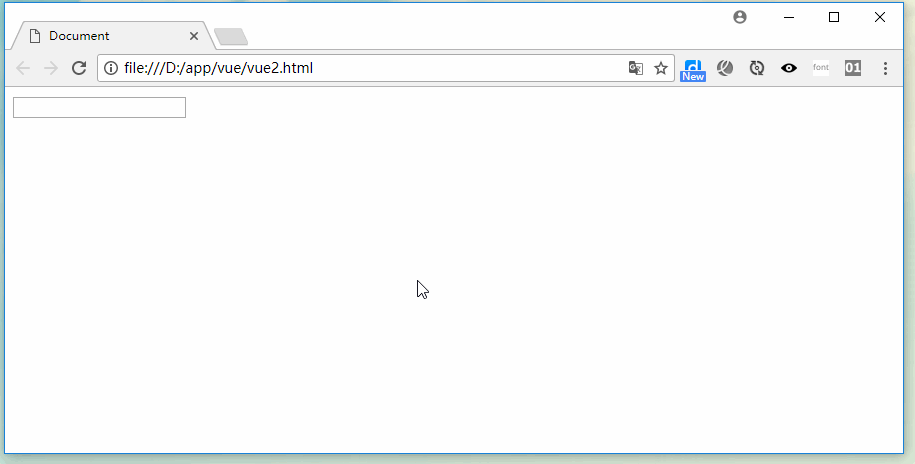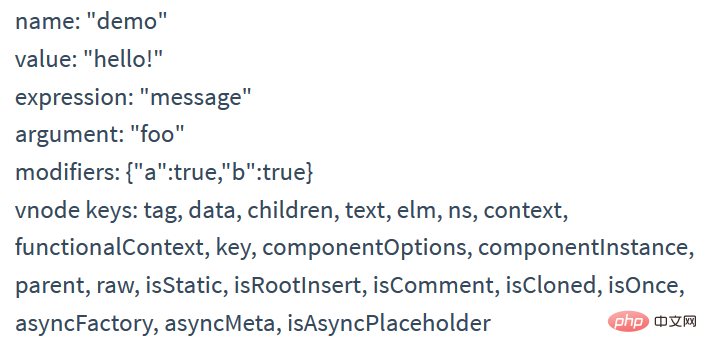Learn about custom directives in Vue

In addition to the default core directives ( v-model and v-show ), Vue also allows the registration of custom directives. In Vue, the main form and abstraction of code reuse is components. However, in some cases, it is still necessary to perform low-level operations on pure DOM elements, in which case custom instructions are used. This article will introduce Vue custom instructions in detail
Instruction registration
Taking an input element to automatically obtain focus as an example, when the page loads, use autofocus to allow the element to obtain focus. But autofocus doesn't work on mobile Safari. Now register a directive that makes the element automatically gain focus
Instruction registration is similar to component registration, including global directives and local directives
[Global directive]
Use Vue. diretive() to register instructions globally
// 注册一个全局自定义指令 v-focusVue.directive('focus', { // 当绑定元素插入到 DOM 中。
inserted: function (el) { // 聚焦元素 el.focus()
}
})[Local instructions]
You can also register local instructions. The component or Vue constructor accepts a directives option
var vm = new Vue({
el: '#example',
directives:{
focus:{
inserted: function (el) {
el.focus()
}
}
}
}) The new v-focus attribute
<p id="example"> <input v-focus></p>
<script>// 注册一个全局自定义指令 v-focusVue.directive('focus', { // 当绑定元素插入到 DOM 中。 inserted: function (el) { // 聚焦元素 el.focus()
}
})var vm = new Vue({
el: '#example',
})</script>
hook function
directive can then be used on any element in the template The definition function provides several hook functions (optional)
[bind]
It is only called once. It is called when the instruction is bound to the element for the first time. This hook function can be used to define a An initialization action performed once during binding
【inserted】
Called when the bound element is inserted into the parent node (it can be called if the parent node exists and does not have to exist in the document)
[update]
It is called when the VNode of the component is updated, but it may occur before the VNode of its child is updated. The value of the directive may or may not have changed. However, unnecessary template updates can be ignored by comparing the values before and after the update.
【componentUpdated】
The VNode of the component and its children's VNode are called when all are updated
【unbind】
Only called once, called when the instruction is unbind from the element
Hook function parameters
The hook function is given the following parameters
【el】
The element bound by the instruction can be used to directly operate the DOM
【binding】
An object containing the following attributes:
name: 指令名,不包括 v- 前缀。
value: 指令的绑定值, 例如: v-my-directive="1 + 1", value 的值是 2。
oldValue: 指令绑定的前一个值,仅在 update 和 componentUpdated 钩子中可用。无论值是否改变都可用。
expression: 绑定值的字符串形式。 例如 v-my-directive="1 + 1" , expression 的值是 "1 + 1"。
arg: 传给指令的参数。例如 v-my-directive:foo, arg 的值是 "foo"。
modifiers: 一个包含修饰符的对象。 例如: v-my-directive.foo.bar, 修饰符对象 modifiers 的值是 { foo: true, bar: true }。【vnode】
The virtual node generated by Vue compilation
【oldVnode】
The previous virtual node, only in update andcomponentUpdated Available in the hook
[Note] Except for el, other parameters are read-only, so try not to modify them. If you need to share data between hooks, it is recommended to do it through the element's dataset
The following is an example of a custom hook using these parameters
<p id="example" v-demo:foo.a.b="message"></p>
<script>Vue.directive('demo', {
bind: function (el, binding, vnode) { var s = JSON.stringify
el.innerHTML =
'name: ' + s(binding.name) + '<br>' +
'value: ' + s(binding.value) + '<br>' +
'expression: ' + s(binding.expression) + '<br>' +
'argument: ' + s(binding.arg) + '<br>' +
'modifiers: ' + s(binding.modifiers) + '<br>' +
'vnode keys: ' + Object.keys(vnode).join(', ')
}
})new Vue({
el: '#example',
data: {
message: 'hello!'
}
})</script>
[Function abbreviation]
In most cases, you may want to perform repeated actions on the bind and update hooks, and do not want to care about other hook functions. You can write it like this:
Vue.directive('color-swatch', function (el, binding) {
el.style.backgroundColor = binding.value
})[Object literal]
If the instruction requires multiple values, you can pass in a JS object literal. The instruction function can accept all legal types of JS expressions
<p v-demo="{ color: 'white', text: 'hello!' }"></p>Vue.directive('demo', function (el, binding) {
console.log(binding.value.color) // => "white"
console.log(binding.value.text) // => "hello!"
})Related recommendations:
2020 Front-end Vue interview questions summary (with answers)
vue tutorial recommendation: The latest 5 vue.js video tutorial selections in 2020
For more programming-related knowledge, please visit: Programming teaching! !
The above is the detailed content of Learn about custom directives in Vue. For more information, please follow other related articles on the PHP Chinese website!

Hot AI Tools

Undresser.AI Undress
AI-powered app for creating realistic nude photos

AI Clothes Remover
Online AI tool for removing clothes from photos.

Undress AI Tool
Undress images for free

Clothoff.io
AI clothes remover

AI Hentai Generator
Generate AI Hentai for free.

Hot Article

Hot Tools

Notepad++7.3.1
Easy-to-use and free code editor

SublimeText3 Chinese version
Chinese version, very easy to use

Zend Studio 13.0.1
Powerful PHP integrated development environment

Dreamweaver CS6
Visual web development tools

SublimeText3 Mac version
God-level code editing software (SublimeText3)

Hot Topics
 1376
1376
 52
52
 How to reference js file with vue.js
Apr 07, 2025 pm 11:27 PM
How to reference js file with vue.js
Apr 07, 2025 pm 11:27 PM
There are three ways to refer to JS files in Vue.js: directly specify the path using the <script> tag;; dynamic import using the mounted() lifecycle hook; and importing through the Vuex state management library.
 How to use watch in vue
Apr 07, 2025 pm 11:36 PM
How to use watch in vue
Apr 07, 2025 pm 11:36 PM
The watch option in Vue.js allows developers to listen for changes in specific data. When the data changes, watch triggers a callback function to perform update views or other tasks. Its configuration options include immediate, which specifies whether to execute a callback immediately, and deep, which specifies whether to recursively listen to changes to objects or arrays.
 How to use bootstrap in vue
Apr 07, 2025 pm 11:33 PM
How to use bootstrap in vue
Apr 07, 2025 pm 11:33 PM
Using Bootstrap in Vue.js is divided into five steps: Install Bootstrap. Import Bootstrap in main.js. Use the Bootstrap component directly in the template. Optional: Custom style. Optional: Use plug-ins.
 What does it mean to lazy load vue?
Apr 07, 2025 pm 11:54 PM
What does it mean to lazy load vue?
Apr 07, 2025 pm 11:54 PM
In Vue.js, lazy loading allows components or resources to be loaded dynamically as needed, reducing initial page loading time and improving performance. The specific implementation method includes using <keep-alive> and <component is> components. It should be noted that lazy loading can cause FOUC (splash screen) issues and should be used only for components that need lazy loading to avoid unnecessary performance overhead.
 How to add functions to buttons for vue
Apr 08, 2025 am 08:51 AM
How to add functions to buttons for vue
Apr 08, 2025 am 08:51 AM
You can add a function to the Vue button by binding the button in the HTML template to a method. Define the method and write function logic in the Vue instance.
 Vue realizes marquee/text scrolling effect
Apr 07, 2025 pm 10:51 PM
Vue realizes marquee/text scrolling effect
Apr 07, 2025 pm 10:51 PM
Implement marquee/text scrolling effects in Vue, using CSS animations or third-party libraries. This article introduces how to use CSS animation: create scroll text and wrap text with <div>. Define CSS animations and set overflow: hidden, width, and animation. Define keyframes, set transform: translateX() at the beginning and end of the animation. Adjust animation properties such as duration, scroll speed, and direction.
 How to query the version of vue
Apr 07, 2025 pm 11:24 PM
How to query the version of vue
Apr 07, 2025 pm 11:24 PM
You can query the Vue version by using Vue Devtools to view the Vue tab in the browser's console. Use npm to run the "npm list -g vue" command. Find the Vue item in the "dependencies" object of the package.json file. For Vue CLI projects, run the "vue --version" command. Check the version information in the <script> tag in the HTML file that refers to the Vue file.
 How to return to previous page by vue
Apr 07, 2025 pm 11:30 PM
How to return to previous page by vue
Apr 07, 2025 pm 11:30 PM
Vue.js has four methods to return to the previous page: $router.go(-1)$router.back() uses <router-link to="/" component window.history.back(), and the method selection depends on the scene.




